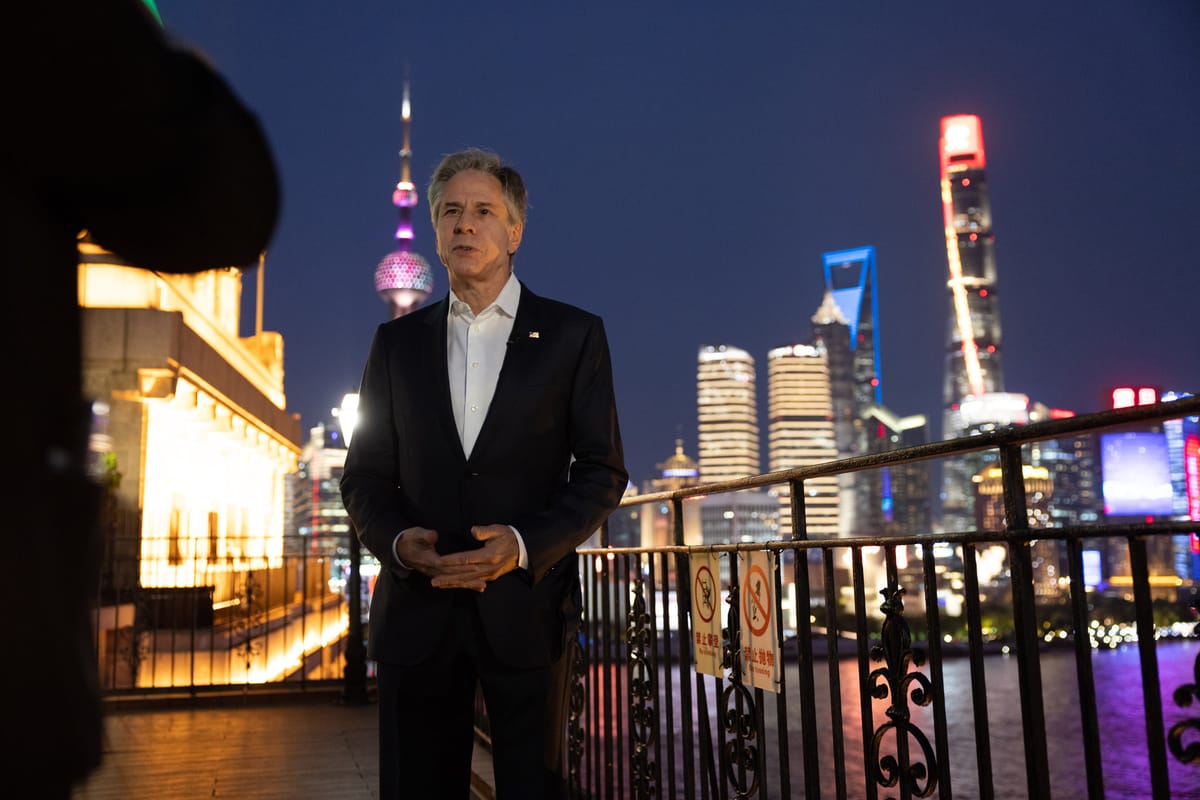Blinken Struggles to Untangle Beijing Relations on China Visit

The Lede: On Friday, U.S. Secretary of State Antony Blinken concluded a three-day visit to China with meetings with Chinese President Xi Jinping and Foreign Minister Wang Yi. Blinken’s visit began on the same day that Washington passed a massive foreign aid bill that set aside billions of dollars to counter China in the Indo-Pacific region as the two superpowers struggle to find common ground on fundamental disagreements.
What We Know:
- Xi warned that Washington and Beijing should not engage in ‘vicious competition’ and that the U.S. should stop ‘saying one thing and doing another,’ portraying China as an enemy.
- Economic issues discussed between Blinken and Chinese leaders include China’s industrial overcapacity, U.S. measures barring the trade of key goods to China, and China’s production of chemicals used in the processing of fentanyl in Mexico.
- Blinken pointed out China’s continued material support of Russia in its war in Ukraine as a major sore spot where Washington and Beijing have opposing interests.
- Wang noted that the U.S. needed to respect China’s ‘red lines,’ the most significant of which is the territorial claims over Taiwan. Blinken also discussed with the Chinese foreign minister Washington’s increasing involvement in matters regarding the overlapping claims in the South China Sea and defense cooperation with its Indo-Pacific partners.
- In addition to his highest-level meetings, Blinken also met with Shanghai’s top official Chen Jining, students of NYU’s Shanghai campus, and business leaders in the country’s financial hub before flying to Beijing.
The Background: In early April, U.S. Secretary of the Treasury Janet Yellen also visited China where many of the areas of economic disagreements between the superpowers remained unresolved. U.S. Secretary of Commerce Gina Raimondo has also made recent high-profile visits to China. China has been the top supplier of machine tools, microelectronics, drone technologies, materials such as nitrocellulose used for gunpowder, and other dual-use items that have been vital to Russia’s defence industrial base in the war in Ukraine. Last week, U.S. President Joe Biden signed a bipartisan foreign aid package that includes $8 billion for spending to counter China’s military as well as more than $60 billion in aid for Ukraine. The bill also included the controversial measure to ban the social media platform TikTok if its China-based parent company does not divest from it.
Likely Outcomes:
- Both sides are likely getting tired of the same rhetoric around managing the U.S.-China relationship and that both countries want to ensure a level playing field with their interests preserved. At this point, the meetings serve to reassure each side that these are the same people with the same positions that they have been dealing with as both countries rush ahead in measures to counter the other.
- China will likely double down on its engagement with Russia as both countries continue to perceive the U.S. opposition and coalition-building against them. This was a point in Blinken and Yellen’s visits that absolutely did not budge in their meetings. Washington’s latest foreign aid bill virtually guarantees increased funding and militarization on Russia and China’s peripheries.
- Both Biden and Trump have also promised tariffs and economic pressure on China so these policies are set to continue no matter who wins the upcoming presidential election. From the perspective of the President, an increasingly narrow window of error will be available to tread as the possibility of either country overstepping a red line ratchets up. The recent confirmation that the U.S. has stationed Green Berets on the small Taiwan controlled Kinmen Island just miles away from Mainland China is just such a situation that could lead to miscalculation.
Quotables:
“Expect these talks to be characterised in typical diplomatic jargon as “frank and productive” and a further indication of growing stability in the relationship. The words are intended to reassure, but an escalation in trade tensions is all but certain.” - Stephen Olson, senior adjunct fellow at Pacific Forum
“I have said many times that the Earth is big enough for China and the United States to develop together and prosper independently. China would like to see a confident, open, prosperous and developing United States. We hope that the United States can also take a positive view of China’s development. China is willing to cooperate, but cooperation should be two-way … China insists on non-alignment, and the United States should not engage in ‘small blocs’. Both parties can have their own friends and partners, and should not target, oppose, and harm each other.” - Xi Jinping, President of China
“If the United States always regards China as its main rival, China-US relations will continuously face troubles and many problems.” - Yang Tao, director general of North American and Oceania affairs at the Chinese Foreign Ministry
“The United States keeps making groundless accusations over the normal trade and economic exchanges between China and Russia … to fan the flames or to smear others and shift the blame is no way to solve the Ukraine issue.” - Wang Wenbin, spokesperson of the Chinese Foreign Ministry
Good Reads:
Blinken tells Beijing: Stop boosting Russia or face punishments (Politico)
US-China relations: Xi tells Blinken America cannot ‘say one thing and do another’ (SCMP)
Xi Jinping tells Antony Blinken US should avoid ‘vicious competition’ with China (FT)
For all the diplomatic reassurance, US-China trade tensions are growing (SCMP)
How Janet Yellen struggled to move the needle on US-China trade (Financial Times)
The US and China talk past each other on most issues, but at least they’re still talking (AP)
